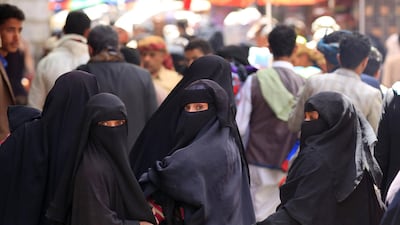UN investigators have uncovered a pattern of abuse, rape and arbitrary detention against women activists in Houthi-held areas of war-torn Yemen as the rebels impose their extreme ideology on the population.
In an annual report, a panel of UN experts condemned a “Houthi policy of sexual violence and repression against politically active and professional women” in the capital Sanaa and other parts of Yemen’s rebel-held north.
Militiamen have made women and other vulnerable groups the target of a “systematic campaign to ensure the population's adherence to their ideology” and win local support for their war against pro-government forces, researchers said.
The 300-page report, covering the year to December 5, 2021, documented nine instances when the Iran-aligned movement “detained, tortured, maimed, sexually violated or repressed politically or professionally active women”.
The Houthis routinely go after women who eschew their rule, accusing them of “prostitution” and collecting “sexually compromising video recordings” for blackmail and to discredit them in the eyes of locals, the report says.
“These measures also have a deterrent effect on other female leaders,” said the report.
“Increased repression of women expressing political views affects their capacity to take part in decision-making processes related to the resolution of conflict.”
The Houthis pressure locals to attend summer camps and cultural courses that promote their ideology, UN researchers said. Two women who refused to attend the indoctrination sessions were arrested and raped.
Abuses against women continued even after Sultan Saleh Aida Aida Zabin, the Houthi police chief in Sanaa, was hit with UN sanctions last February after a wave of detentions, torture and sexual violence against women activists in his jails.
Those rounded up by the Houthis seldom have a fair trial. Some are “arbitrarily detained for years” and, when released, re-enter society with nothing, having “lost their houses and jobs”, researchers said.
“This is particularly the case for women who, in addition to trauma, have to face the social stigma associated with their detention,” said the report, which has circulated among Security Council members in recent days.
A Houthi spokesman did not immediately answer The National’s request for comment.
Yemen has been mired in violence since the Houthis stormed Sanaa in 2014, then removed the internationally recognised government.
A Saudi Arabia-led military coalition intervened the following year to restore the government.
The war has claimed more than 300,000 lives, directly and indirectly, the UN says, and spawned a humanitarian crisis, leaving more than 80 per cent of the country's 30 million people in need of aid.







